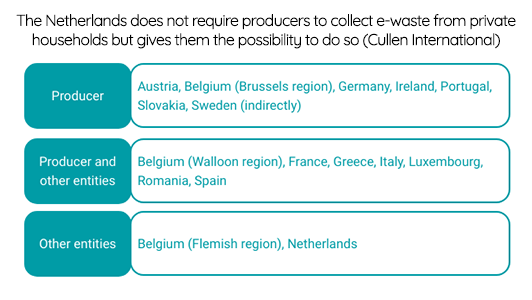Producers of electrical and electronic equipment (EEE) are regularly required to collect electronic waste (e-waste) from private households. Some member states designate this responsibility only to the producer, while other member states allow producers to share the responsibility with other entities, such as municipalities or distributors.
Member states can also require EEE producers to inform buyers of the costs of the environmentally sound collection, treatment and disposal of EEE when purchasing new products. In France, Luxembourg, Portugal and Sweden, producers share the responsibility of providing such information to buyers with other entities, such as municipalities, distributors, eco-organisations or environmental administrations.
Penalties for infringements of the national provisions on e-waste can be implemented through warnings, fines or imprisonment. In different countries and for different infringements, fines range from €100 to €5m, while imprisonment is also a possibility in Ireland and Luxembourg.

Cullen International’s new benchmark tracks the implementation of the waste electrical and electronic equipment directive (WEEE) in 14 EU member states. The benchmark focuses on requirements concerning:
- producer obligation to collect e-waste from private households;
- producer obligation to inform consumers on the collection, treatment and disposal of e-waste;
- e-waste collection rates;
- e-waste treatment;
- recovery and recycling targets; and
- penalties.
The WEEE directive aims to ensure the efficient use of resources by preventing and recovering waste from electrical and electronic equipment.
For more information on the benchmark and Cullen's complete WEEE directive coverage, please click on “Access the full content” - or on “Request Access”, in case you are not subscribed to our Sustainability service.
more news
25 April 25
FTTH roll-out in MENA expands with different approaches to deployment
Our latest NGA deployments benchmark shows that all of the 13 studied countries in the Middle East and North Africa region (MENA) have started to deploy fibre-to-the-home (FTTH) networks.
24 April 25
Understand the EU’s VAT and customs rules for cross-border e-commerce
Cullen International’s new report explains how EU VAT and customs rules apply to imported e-commerce goods, as well as describing the customs reform package, proposed by the European Commission in 2023.
23 April 25
Tower transactions in Europe continue to draw competition scrutiny
The European passive mobile infrastructure markets have seen a large number of mergers and acquisitions in recent years, attracting scrutiny from competition authorities. Cullen International’s new report draws on merger control decisions to explain how competition works in the market and what concerns, if any, authorities have raised about different types of transactions.